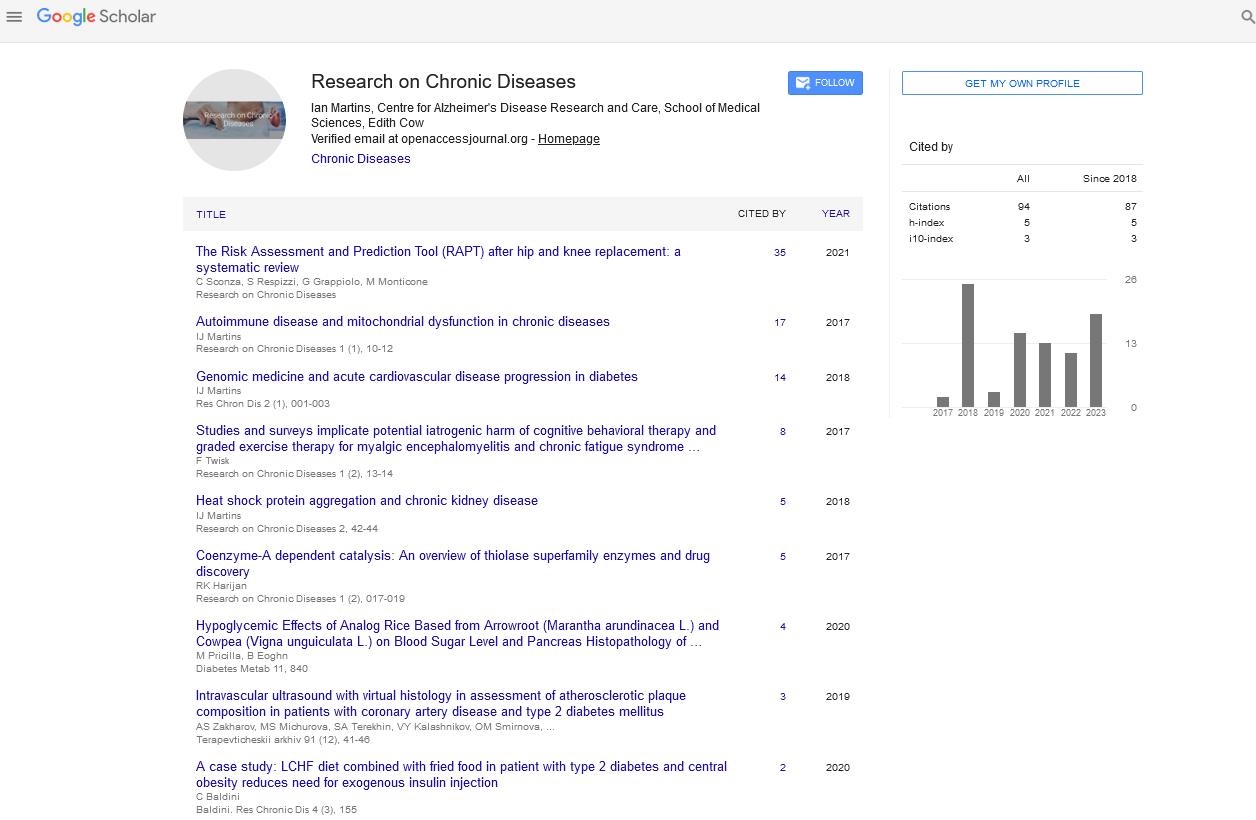Perspective - Research on Chronic Diseases (2024) Volume 8, Issue 1
Unraveling the Complexity of Type 2 Diabetes: A Comprehensive Exploration
- Corresponding Author:
- Jingxian Zeng
Department of Medicine, The University Hospital of Wuhan Sports University, Wuhan, China
E-mail: Zeng@mail.gmail.edu.com
Received: 02-Jan-2024, Manuscript No. OARCD-24-124704; Editor assigned: 04-Jan-2024, PreQC No. OARCD-24-124704 (PQ); Reviewed: 18-Jan-2024, QC No. OARCD-24-124704; Revised: 25-Jan-2024, Manuscript No. OARCD-24-124704 (R); Published: 02-Feb-2024, DOI: 10.37532/OARCD.2024.8(1).144-145
Introduction
In the realm of chronic diseases, Type 2 Diabetes mellitus (T2DM) takes center stage as a pervasive and complex health challenge affecting millions worldwide. Characterized by insulin resistance and impaired glucose metabolism, type 2 diabetes poses significant risks to overall health and well-being. In this comprehensive exploration, we delve into the intricacies of type 2 diabetes, examining its causes, risk factors, complications, management strategies, and the evolving landscape of research and innovation.
Understanding type 2 diabetes
Type 2 diabetes is a chronic metabolic disorder characterized by elevated blood glucose levels resulting from insulin resistance and inadequate insulin secretion. Insulin, a hormone produced by the pancreas, plays a crucial role in facilitating the uptake of glucose into cells for energy. In individuals with type 2 diabetes, the body’s cells become resistant to the effects of insulin, leading to an accumulation of glucose in the bloodstream.
Description
Complications of type 2 diabetes
Type 2 diabetes is not confined to elevated blood glucose levels; it can lead to a range of complications that affect various organ systems. Understanding these complications is crucial for comprehensive diabetes management:
Cardiovascular complications: Individuals with type 2 diabetes have an increased risk of heart disease, heart attacks, and stroke. The combination of elevated blood glucose levels, hypertension, and abnormal lipid profiles contributes to cardiovascular complications.
Neuropathy: Diabetes can cause damage to nerves, leading to peripheral neuropathy. This condition results in tingling, numbness, and pain in the extremities, affecting quality of life and increasing the risk of injuries.
Nephropathy: Diabetes is a leading cause of kidney disease. Persistent high blood glucose levels can damage the kidneys over time, leading to diabetic nephropathy and, in severe cases, kidney failure.
Retinopathy: Diabetes can affect the blood vessels in the eyes, leading to diabetic retinopathy. This condition can result in vision impairment and blindness if not detected and managed promptly.
Management strategies for type 2 diabetes
The management of type 2 diabetes involves a multifaceted approach that encompasses lifestyle modifications, medication, and regular monitoring. The primary goals of diabetes management are to achieve and maintain optimal blood glucose levels, prevent complications and enhance overall well-being:
Lifestyle modifications
Healthy diet: Adopting a balanced and nutritious diet is fundamental to diabetes management. Emphasizing whole grains, fruits, vegetables, lean proteins and healthy fats while limiting the intake of refined carbohydrates and sugars is crucial.
Regular physical activity: Engaging in regular exercise helps improve insulin sensitivity, aids in weight management, and contributes to overall cardiovascular health.
Weight management: Achieving and maintaining a healthy weight is a cornerstone of type 2 diabetes management. Weight loss can improve insulin sensitivity and glycemic control.
Medication
Oral medications: Various oral medications, such as metformin, sulfonylureas and Dipeptidyl Peptidase-4 (DPP-4) inhibitors, may be prescribed to help control blood glucose levels.
Insulin therapy: In some cases, individuals with type 2 diabetes may require insulin therapy to supplement or replace endogenous insulin.
Regular monitoring
Regular monitoring of blood glucose levels is essential for individuals with type 2 diabetes. This may involve self-monitoring using blood glucose meters or continuous glucose monitoring systems.
Blood pressure and lipid control
Managing hypertension and dyslipidemia is integral to preventing cardiovascular complications. Medications such as Angiotensin Converting Enzyme (ACE) inhibitors and statins may be prescribed.
Diabetes education
Diabetes education programs empower individuals to understand and manage their condition effectively. Education covers topics such as nutrition, medication management and lifestyle modifications.
Research and innovation in type 2 diabetes
The landscape of type 2 diabetes research is continually evolving, with ongoing efforts to understand the underlying mechanisms, improve treatment modalities and explore avenues for prevention. Key areas of research and innovation include:
Personalized medicine: Advances in genetic research aim to identify individualized treatment approaches based on genetic factors. Personalized medicine holds the potential to optimize diabetes management and improve treatment outcomes.
Artificial pancreas systems: Continuous glucose monitoring coupled with insulin delivery systems is a promising avenue for improving glycemic control. Artificial pancreas systems aim to automate insulin administration based on real-time glucose levels.
Bariatric surgery: Bariatric surgery has demonstrated significant benefits in improving glycemic control and inducing diabetes remission in some cases. Ongoing research explores the mechanisms behind these effects and identifies suitable candidates for surgery.
Novel medications: Research continues to explore novel medications that target different aspects of glucose metabolism. This includes medications that enhance insulin sensitivity, promote weight loss and modulate hormonal pathways involved in diabetes.
Digital health solutions: The integration of digital health tools, including mobile applications and wearable devices, offers new opportunities for diabetes management. These tools enable real time monitoring, data analysis and personalized interventions.
Conclusion
Type 2 diabetes remains a formidable global health challenge, necessitating a holistic and individualized approach to management. By unraveling the complexities of its causes, understanding the risk factors, and implementing proactive lifestyle modifications and medical interventions, individuals with type 2 diabetes can achieve optimal glycemic control and prevent complications.
The evolving landscape of research and innovation holds promise for improved treatment modalities and prevention strategies. As we continue to explore the frontiers of diabetes science, the imperative remains clear: A comprehensive and collaborative effort is essential to address type 2 diabetes, enhance public awareness, and pave the way for a healthier future. Through education, research, and innovative approaches to care, we can confront the complexities of type 2 diabetes and strive for a world where individuals live healthier, fulfilling lives despite this chronic condition.
